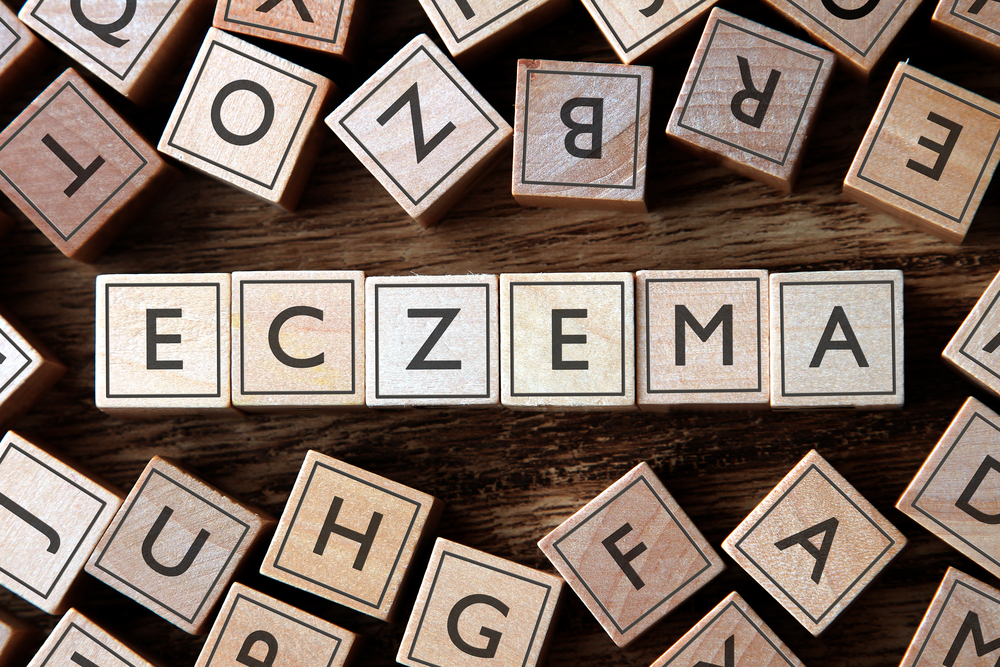Eczema is a painful, embarrassing and frustrating skin condition that currently affects over 35 million Americans.¹ Even though it is not a life-threatening medical condition, eczema makes skin swell up and get red, painful and blistery. It can get in the way of daily activities and lead to unwanted discomfort. Fortunately, there are many great treatments that can make dealing with eczema much more manageable.

What’s Eczema?
Eczema is a skin condition with no known cure that comes in various forms including stasis dermatitis, seborrheic dermatitis, nummular eczema, dyshidrotic eczema, contact dermatitis and atopic dermatitis. The exact cause of eczema remains uncertain. It is not infectious and cannot be spread by contact.² It causes skin to become irritated, red, leathery, dry, cracked and discoloured from itching. There are many treatments that can help to improve the symptoms of eczema.
OTC Medication
Over-the-counter medication from CVS, Wal-Mart or Walgreens is one option for treating eczema. The medication for eczema is usually some kind of cream that hydrates skin and sometimes a medication with hydrocortisone that can soothe the burning, itchy sensation that tempts those suffering from eczema to scratch and make the situation worse. Medications include calcineurin inhibitors, azathioprine (Imuran), cyclosporine and methotrexate.³ Before taking any new medications, be sure to check with a doctor first to make sure it is safe.
Prescription Medication
If you are suffering from a particularly serious case of eczema, prescription medication can sometimes provide the extra dermatological boost to lead to improvement. Your doctor has the ability to prescribe stronger creams with powerful steroids that can help to soothe skin, cut down itchiness and lead to a reduction in symptoms.⁴
Natural Healing From Eczema
There are natural approaches to treating eczema including coconut oil, peppermint oil, calendula oil, tea tree oil and eucalyptus oil. Some have reported success by using these on the areas impacted by eczema.⁵ It is important to first apply a very small amount with a cotton swab to the inner arm to make sure your skin does not have any adverse reactions to the oils.
Meditation has also been found to help with eczema by cutting down on the urge to scratch and reducing the stress response to symptoms.⁶ Given the numerous other benefits of meditation as well, it is definitely something worth considering.
Having Baths with Added Ingredients
Having baths can also be an effective way to fight back against eczema symptoms. It is advised not to use soap for these baths and to hydrate and rub lotion on skin right after stepping out. It can also be highly helpful to add colloidal oatmeal, baking soda or vinegar to the water as natural skin boosters that will help counteract the effects of the eczema.⁷
Tackling Eczema
Whichever treatment options are pursued in the fight to tackle eczema, know that you are not alone and that other people suffering from the uncomfortable condition have managed to treat it sufficiently to still live an active and fulfilling life. Researching your own treatment path online, choosing to see a doctor, talking to friends and family and studying research on the newest treatments for eczema is always highly recommended.
When it comes to the best ways to treat eczema you have various options and the only step left is to consider which is best for you and to then see which methods result in improvement in your symptoms.⁸ With the right doctor and the right attitude, eczema can be just a bump in the road of a satisfying and rewarding life.
[1] https://www.neosporin.com/eczema/what-is-eczema
[2] https://nationaleczema.org/eczema/
[3] https://www.healthline.com/health/atopic-dermatitis/severe-eczema-treatments
[4] https://nationaleczema.org/eczema/treatment/topicals/
[5] https://www.bustle.com/p/the-6-best-essential-oils-for-eczema-18754071
[6] https://nationaleczema.org/meditation-ease-itch/
[7] https://nationaleczema.org/eczema/treatment/bathing/
[8] https://www.mayoclinic.org/diseases-conditions/atopic-dermatitis-eczema/diagnosis-treatment/drc-20353279


